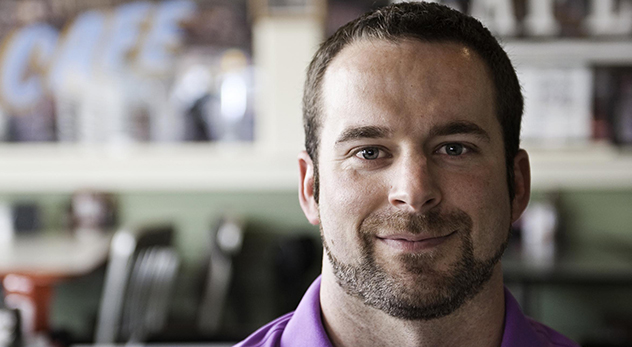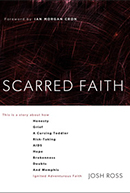It can be a scary thing for a Christian to question their faith or the teachings of their their church. The stakes are even higher when you’re a pastor. Josh Ross knows this firsthand.
In Scarred Faith, Josh writes a frank account of his personal experience with doubt and the grief that preceded it. The book’s subtitle simultaneously conveys the light and dark sides of following God: “This is a story about how Honesty, Grief, a Cursing Toddler, Risk-Taking, AIDS, Hope, Brokenness, Doubts, and Memphis ignited adventurous faith. Here, he shares his personal story of loss and why he believes pain can spur anyone, even a pastor, can follow God when it doesn’t make sense.
JM : What prompted you to write this book?
JR: When I sat down to write much of the content in Scarred Faith, I didn’t have publication in mind. Instead, writing was a commitment I made in the season of Lent in 2011 to work through some of my own pain and brokenness. A year earlier, in January 2010, we decided to sell our home in the suburbs of Memphis and relocate in an underprivileged neighborhood in the heart of the city. Within three weeks of making that decision, we were dealt a catastrophic blow with the tragic death of my older sister, Jenny. She was thirty-one, healthy, a wife, and a mother of a precious nine-year-old daughter. A strand of Strep entered into her blood stream and after eighteen days in ICU, she lost her life on February 22nd. In a weird way, her death inspired us to engage Memphis with even more purpose and intentionality.
So, I sat down to write, because I needed space to wrestle with faith questions. For me, the questions weren’t about God’s existence, but his intervention. This project began as a place for me to heal. It was about midway through the season of Lent when I began thinking that maybe I had a story to tell.
JM: Why do so many pastors fear doubt? Why shouldn’t they fear doubt and questions?
JR: One cannot argue with the fact that we (the Western world) have been heavily influenced by the Enlightenment period. We tend to celebrate certainty and dismiss questions of doubt as weak faith. I’m not so sure that’s how Jesus thought about doubters. The Great Commission is one of the staple passages of every Christian faith group. It’s quoted and preached regularly urging us to engage in the world around us. But what’s interesting is that the verse before The Great Commission, in Matthew 28:17, we have this, “When they saw him, they worshipped him; but some doubted.” We must acknowledge, and I think we need to celebrate, that Jesus doesn’t separate the doubters from the others before commissioning them. He dispensed power and responsibility even to those wrestling with uncertainty.
I’m sure pastors are fearful because we know that occasionally doubts can lead to unbelief. But I think we need to be more fearful of strangling the freedom to lay hard questions before God, trusting that he can nurture us through the uncertainty. One of my close friends and mentors taught me over a decade ago that the opposite of faith isn’t doubt, but complacency. I think he’s right. Sometimes it isn’t the answers we need to ignite adventurous faith, but the wrestling match that comes with asking honest questions and being formed through the journey.
JM: What is the biggest mistake people make when they either begin to doubt or someone they love (or lead) confesses to doubt?
JR: Here’s reality: you can keep kids from asking questions until they go to college. Then, they tend to question everything. It’s essential for the local church to recover the beauty of embracing hard questions as potential seasons of exponential spiritual development. One of the biggest mistakes we make is to panic, as if the status of someone’s soul is immediately on the line when they begin to ask questions about what God is up to in the world. People need sacred space—a safe environment—to come before God with the concerns of their heart. After all, only one time in the prayers of Jesus does he refer to God as anything other than Father. Fathers create safe space for their children to share burdens, pain, unrest, and questions.
We need to read and honor James 1:5-8. We can’t dismiss it. James has some strong words about doubting. I think the best way to understand those words is to consider that the “never doubting” referred to is one of many ways James talks about having full trust in God. It doesn’t mean you must be absolutely certain that what you pray for will be given. The charge is to not be double-minded. Your heart is to be set on God; even in the midst of doubt.
The breakthrough for me as I engaged some of the challenges in Memphis and grieved my sister’s death was when I felt confident that God’s grace could hold me through any question and/or any emotion I had towards God. He received me as I was, and I have lived to testify to the peace and healing I received through the struggle.
JM: How do you think Christians and churches can better prepare to minister to doubters and to become doubters themselves?
JR: One idea I push hard in Scarred Faith is that if we do not want to experience moments of doubt and questioning what God is up to, we must live with low expectations of God. We can avoid ever feeling that God has let us down if we believe that he did stuff years ago and will be there in the end to make things right, but today is currently hands-off. If, on the other hand, we choose to live with high expectations of God’s activity in the world, we will confront forms of brokenness and distress at times which will leave us wondering what in the world is going on.
I think that the church of the 21st century must create space for questions and doubts while at the same time abandoning the idea that its primary task is to fix the person and provide absolute answers. Instead, the church’s primary responsibility is simply to bear witness to a God who enters into the struggle with us.
JM: You are a pastor. How do you respond when someone confides their doubts in you?
JR: I regularly have these somewhat humorous meetings with people in my church or community. They come to my office, open up about their own brokenness, and then express that they are angry or frustrated with God because they don’t understand.
At some point they’ll ask, “Can I ask questions of God or express to him the frustration in my heart?”
My response goes like this, “Do you believe God can hear our conversation right now? If he can hear you express to me what you are feeling about him, don’t you think he’d prefer for you to talk to him about it? Try it. Trust that his grace will hold you through it.”
How I pastor people has changed over the years. When I was finally convinced that my responsibility isn’t to heal and save people, I was relieved. Jesus has always done a pretty good job saving and healing. I am convinced that my God-given task is to let people know that God isn’t only interested in delivering people from pits. He also wants people to know that he gets down in pits with them as they struggle. It’s the power and love of the incarnation of Jesus. God’s grace can get lower than our lowest low. Few things have ignited my faith over the past few years more than this reality.
JM: In his latest book, Rob Bell shared how he came face to face with his own faith crisis on Easter Sunday several years ago, the panic that created, and how he ended up in counseling. You are a pastor, yourself. How do you handle your own questions and doubts? What lessons have you learned along the way that might help other Christian leaders in this same situation?
JR: In chapter 4 of Scarred Faith, I share a version of a letter I wrote to God a couple of months after Jenny died. It was extremely raw and honest. I had to write it, because I was going through a faith crisis of my own. I never considered giving up on God. As expressed earlier, my questions and struggles were with the intervention of God. When does God choose to stick his finger into a situation to redeem it, and when does he keep his hands off? I had close friends, a tight-knit community, who affirmed this move in my life to get away on a mountain to lay my heart before God. So I did. I didn’t receive answers to all my questions, but I did receive a mystical, hard-to-explain, assurance that God is as much horizontal as he is vertical. He abides in our celebrations and in our miseries. And in a strange way, for me, that was enough to urge me to dive deeper into God’s love for this world.







